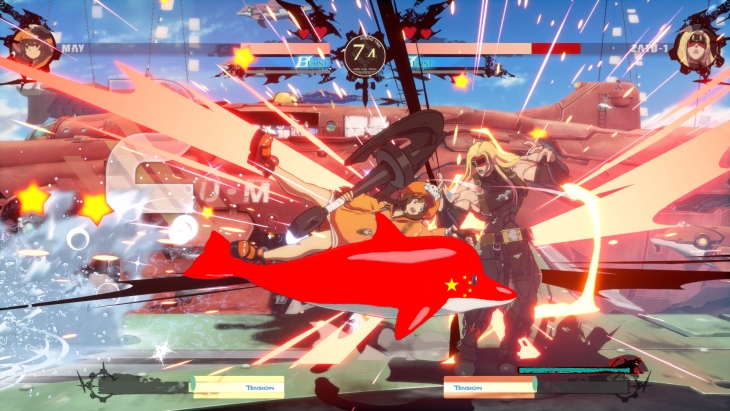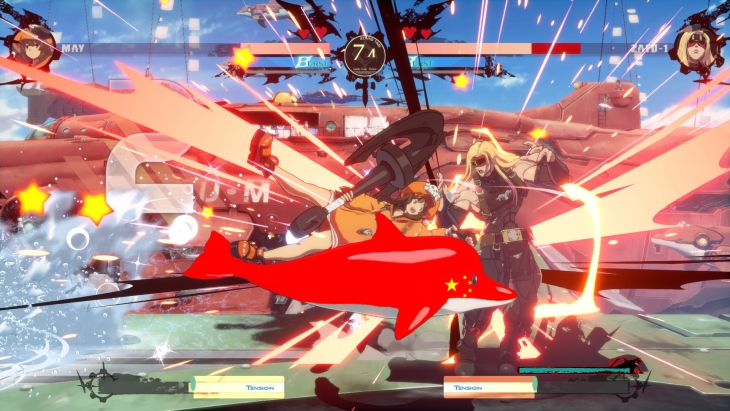
Arc System Works have updated the lore for Guilty Gear -Strive- removing mention of Taiwan, Tibet, Uyghur; all controversial elements for Chinese players.
The change was spotted by “AAK” on ResetEra, who in turn had discovered it from Steam forums. A recent update for the game- around June 22nd- had seemingly altered one of the in-game glossaries on the series back-story. You can find the screenshots here.
The glossary section is regarding “International Affairs after the Crusades;” a hundred years war between humanity and the artificial magical creatures called Gears.
Originally the glossary notes that after the Crusades, countries with a high population density and tended to import food could not solve their issues with energy alone; notably Korea, Taiwan, and Singapore.
China also expanded their borders at that time to encompass Uighur (also spelled Uyghur, and in real life would be the Xinjiang Uyghur Autonomous Region), Tibet, Inner Mongolia, Mongolia, and Sibera. This reduced their indigenous races and tribes with the influx of Chinese. China also expanded their territorial waters.
At least one Chinese user on Steam had discussed the glossary entry, and shared the screenshot via the Steam Community. Translation (via DeepL) and the upload date (June 11th) would indicate the screenshot was prior to the update; but comments both praise and lament the original segment.
It is worth pointing out some may have objected in order to obtain “social credit.” In short; social credit in China grants perks for “good citizens” (access to better schools for your children), and restrictions on “bad citizens” (publicly named and shamed, or banned from using public transport).
The updated segment removes mention of Korea, Taiwan, and Singapore; only mentioning “countries and regions in Asia.” While the Chinese expansion has remained, it only mentions they encompassed “nearby regions.”
While it is surprising if the censorship had not already been done with the Chinese version of the game, it was likely brought to international versions after outcry by Chinese users with access to those versions, or outcry from only the Chinese version. This is not the first case of gaming companies- or media in general- altering content in international versions to appease outcry in line with Chinese censors.
Due to China being somewhat praised by economists and investors as a highly lucrative market, many media companies have attempted to censor their own works to enable it to be sold under China’s strict laws within their borders. Likewise, Chinese gaming companies tend to obey these laws, even with international releases.
Genshin Impact, from Chinese developer miHoYo, censored any mention of Hong Kong or Taiwan in the in-game chat. Along with then ongoing protests in Hong Kong, the Chinese government’s “One China Policy” refuses to acknowledge either as independent states.
The biggest “Chinese-outcry” story of recent times is the “graduation” of Hololive Vtuber Kiryu Coco. Having previously been suspended for several weeks due to referring to Taiwan as a country, harassment continued long after.
The Chinese Hololive branch was ultimately dissolved, leading many to believe Cover Corp had sided with Kiryu. However, many still suspect that Kiryu had been ousted to prevent the harassment spreading to other Vtubers, and to re-enter the Chinese market.
Most recently, Voice actress Ai Kayano has been removed from Azur Lane, and her credit in Arknights, after outcry from Chinese players of her visit to the Yasukuni Shrine. The Shrine is dedicated to those who died in service to Japan- from civilians to military- including 1,068 who were convicted of war crimes from World War 2.
Previously, 18 ship girls were removed from the Chinese version of Azur Lane along with bunny girl costumes and event from Honkai Impact 3rd; with suspicion that it was due to the crackdown by the Chinese government on lewd content in mobile games.
GOG also announced they would not be selling Chinese-blacklisted horror game Devotion, hours after the developer stated they would. The game is now available via the developer’s website.
Past outcries have included Activision censoring a trailer for Call of Duty Black Ops: Cold War using footage from the Tiananmen Square protests, Capcom censoring the Hong Kong and Rising Sun Japanese flags in Capcom Arcade Stadium, and Animal Crossing: New Horizons reportedly being banned in China due to Hong Kong Protest members it to share their message.
2019 saw Blizzard Entertainment suspend a pro-Hearthstone player for his support of Hong Kong, fire the casters, and the overall poor handing of the entire debacle. Even US Senators wrote to Activision Blizzard CEO Bobby Kotick, condemning the decision.
Blizzard Entertainment finally released a statement, revealing they had returned Blitzchung’s confiscated prize money and reduced his suspension time. In addition, the casters firing was rescinded, instead becoming a ban.
The statement also claimed that “relationships in China had no influence on our decision.” Our report on Blizzard’s financials showed at the time they made less than 13% of their total profit from the Asia-Pacific region.
You can find similar stories in our China and Censorship tags below, or in the links just mentioned.
This is not the first time Guilty Gear -Strive- has been accused of censorship. Directors Daisuke Ishiwatari and Akira Katano insisted in a recent interview they did not censor the character I-No; but “a change in expression to make the game more accessible to more people.” The same interview also discussed how several game mechanics had been altered to be as enjoyable for as many people as possible.
Guilty Gear -Strive- is available on Windows PC (via Steam), PlayStation 4, and PlayStation 5.
Additional Images: Wikipedia
